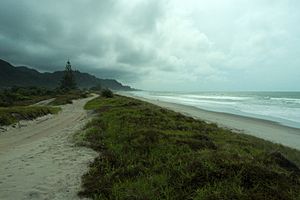Matatā facts for kids
Quick facts for kids
Matatā
|
|
|---|---|
|
Town
|
|

Matatā beach
|
|
| Country | New Zealand |
| Region | Bay of Plenty |
| Territorial authority | Whakatāne District |
| Ward | Rangitāiki General Ward |
| Community | Rangitāiki Community |
| Electorates |
|
| Area | |
| • Total | 0.78 km2 (0.30 sq mi) |
| Population
(June 2023)
|
|
| • Total | 700 |
| • Density | 900/km2 (2,320/sq mi) |
| Postcode(s) |
3194
|
Matatā is a small town located in the Bay of Plenty region on the North Island of New Zealand. It's about 24 kilometers (15 miles) north-west of Whakatāne. Over the years, from 2006 to 2021, many people living in Matatā had to move their homes. This happened because of growing natural dangers, like landslides, made worse by climate change. Matatā's story is an important example of "managed retreat," where a community plans to move away from danger. It teaches us lessons for other places facing similar challenges.
Contents
History of Matatā
Natural Events in Matatā
In 2005, Matatā was hit by two large mudslides, also called debris flows. These came from the Awatarariki and Waitepuru Streams. The mudslides caused a lot of damage to buildings, but luckily, no one was hurt. They were caused by very heavy rain falling quickly. This rain dislodged a huge amount of rocks and mud that had built up.
Starting in January 2005, the area also experienced many small earthquakes. The strongest ones happened in 2005 and 2007. The biggest earthquake was a magnitude 4.2 in May 2007. In 2016, scientists found signs of volcanic activity deep under the town. They detected a buildup of magma about 10 kilometers (6 miles) below the surface. In 2019, the town's name was officially confirmed as "Matatā."
Moving Away from Danger
Because of the 2005 mudslides, the Whakatāne District Council started planning for people to move away. This process is called "managed retreat." Most residents understood the need to move and received help and money from the council. By 2021, almost everyone had moved. However, one resident chose to stay, becoming the town's only remaining occupant. Experts say that deciding to move a whole community is often more about people and politics than just about science.
Marae in Matatā
A marae is a special meeting place for Māori people in New Zealand. It is a very important cultural and spiritual center. Matatā has four main marae:
- Iramoko Marae and Te Paetata meeting house. This marae is connected to the Ngāti Awa hapū (sub-tribe) called Te Tāwera.
- Ngāti Umutahi Marae and Umutahi meeting house. This marae is linked to the Ngāti Tūwharetoa hapū of Ngāti Iramoko, Ngāti Umutahi, and Te Tāwera.
- Ōniao Marae and Tūwharetoa meeting house. This marae is connected to the Ngāti Tūwharetoa hapū of Ngāi Tamarangi, Ngāti Umutahi, and Ngāti Manuwhare.
- Rangitihi Marae and Rangiaohia meeting house. This marae is linked to the Ngāti Rangitihi iwi (tribe).
In October 2020, the New Zealand government gave over $1.6 million to improve Rangitihi Marae and five other local marae. This project also created 10 jobs in the community.
Matatā Population
Matatā is considered a rural settlement by Statistics New Zealand. It covers about 0.78 square kilometers (0.3 square miles). As of 2018, the town had an estimated population of 678 people.
The population of Matatā has slowly grown over the years:
- 2006: 639 people
- 2013: 648 people
- 2018: 678 people
In 2018, there were 249 households in Matatā. There were slightly more females than males. About 20% of the people were under 15 years old.
Education in Matatā
Matatā has two primary schools that teach students from Year 1 to Year 8.
- Matata School is a state primary school. It has about 92 students.
- St Joseph's Catholic School is an integrated primary school. It has about 32 students.
Both schools are coeducational, meaning they teach both boys and girls.

